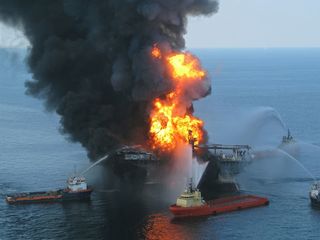Coronavirus Disease 2019
The Ultimate Game of Trial and Error: Lessons to Be Learned
COVID-19 poses a grave threat. So did the Gulf Oil Spill. How we will prevail.
Posted April 17, 2020

The BP Deepwater Horizon blowout occurred on April 20, 2010. By then, several salient misadventures had already made BP a company that many loved to hate. Therefore, it proved unsurprising that BP's numerous failed efforts to contain the Gulf Oil Spill provoked so much derision, and its ultimate success in plugging the leak prompted so little praise.
You may recall much of the colorful lingo for BP's various plugging techniques: top hat, junk shot, saw and cap, top kill, static kill, and bottom kill. You may also recall both commentators and BP employees alike describing the enormity of BP's task.
After the deadly destruction of the Deepwater Horizon, Paul Ausick remarked that: "Trying to stop the leaks is essentially a trial-and-error process that is based on experience gained at shallower depths plugging far smaller leaks" (5/11/2010, 24/7 Wall St). Eric Rosenbaum asked: "Is BP just learning by unavoidable trial and error in a situation where it continues to fail, but deserves an 'A' for effort?" (5/13/2010, TheStreet). Michael Haltman put it most baldly: "BP is now engaged in the ultimate game of trial and error" (5/24/2010, Homeland Security Examiner). And BP executive Kent Wells confided that "We will just learn as we go" (5/16/2010, MSNBC).
BP's problem was undeniably extreme. In our daily lives, we face far less extreme problems. Nevertheless, in any challenging situation, the solution is necessarily hard to find. What to do? For starters, you try things that have worked before in similar situations; because the situations often differ, those solutions may have to be tailored to deal with the new realities.
But these modifications may not work. Then what? You try new things. Many may fail outright. Others may fail, but show promise; such promising leads can then be tinkered with until they do succeed. Finally, novel approaches may suddenly prove successful.
This stumbling, error-prone process is actually how we all learn. As Phyllis Theroux observed: "Mistakes are the usual bridge between inexperience and wisdom." Trial-and-error learning is not to be underestimated and ridiculed, but instead to be understood and appreciated. Quick and easy fixes are rare. Hard work, tolerance to frustration, and persistence pay off.
So, too, does openness to fresh approaches when familiar ones fail. "Mistakes are the portals of discovery," held James Joyce. Such painful lessons have been well learned by even the most illustrious inventors. Thomas Edison observed that "every wrong attempt discarded is another step forward." More recently, Dean Kamin has noted, "Most of the problems we seek to solve require years, sometimes decades, of trial and error."
Science has intensely and assiduously explored trial-and-error learning, although most people know little of this work. The psychologist Edward L. Thorndike began studying trial-and-error learning around 1900. He watched hungry cats escape from "puzzle" boxes with tidbits of fish as their reward for doing so. The cats often flailed about before tripping the switch that secured their release and reward.
The time it took for the cats to escape traced "learning curves" whose shapes were often irregular, but generally downward, testifying to increasingly efficient performance. Thorndike proposed that a powerful selection process had transpired: Starting with random acts, unsuccessful ones ceased, whereas successful ones continued, much as Charles Darwin's better-known Law of Natural Selection eliminates unfit organisms and retains fit ones.
Thorndike named this process of selection by consequences the Law of Effect. Countless empirical studies have confirmed that this law applies equally to animals and humans. It even applies to creativity; rewarding improbable behavior has been found to engender still more improbable, some might say creative, behavior in people, porpoises, and rats. The Law of Effect has also produced important practical benefits, including behavioral therapy, computer-assisted instruction, treatments for drug addiction, and brain-computer interfacing, which permits amputees to control artificial limbs through brain activity.
But our adherence to the Law of Effect has its pitfalls. At the time of the oil spill, President Obama (6/3/2010, Larry King Live) passionately lamented how our ill-conceived actions can affect us and our environment: "I am furious at [the oil spill] situation because this is an example where somebody didn't think through the consequences of their actions. This is imperiling an entire way of life and an entire region for potentially years."
Indeed, it is all too common for people to underestimate the later repercussions of their actions; foresight is notoriously short-sighted. A wealth of scientific research has discovered that both people and animals exhibit poor self-control: They often choose a small, immediate reward over a larger, delayed reward in accord with a key provision of the Law of Effect. This effect of delay on reward value initiates irrational choices and procrastination.
What can we learn from the Gulf Oil Spill? The Law of Effect holds for everyday human behavior, not just for animals in science laboratories. Consequences shape our behaviors, especially those consequences that promptly follow behavior. The Law of Effect generally promotes adaptive behavior, retaining successful actions and eliminating unsuccessful ones. Whatever its limits and liabilities, the Law of Effect provides our best means of surviving in a harsh and uncertain world.
COVID-19 poses an even greater threat to our species than the Gulf Oil Spill. We are once again deploying trial-and-error learning to confront this challenge. The process may not be smooth or fast, but success will be achieved. Much less certain is whether we will have the wisdom and determination to better prepare for the next pandemic, which will inevitably come.




